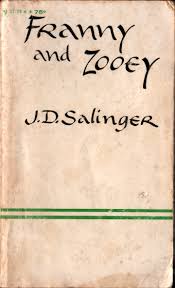Can J.D Salinger do any wrong? 'Franny and Zooey' truly is incredible. 'Franny' was originally published as one of the many short stories penned by Salinger concerning the Glass family and 'Zooey' as a novella. Basically, Franny's story tells that of a girl, the youngest of a family of eccentrics and geniuses, who has grown painfully sick and cynical of all her acquaintances, her college and mankind on the whole. Destructive is the adjective Franny uses to describe herself. As Franny's story unfolds we realise that she is trying to turn to religion for comfort via the utterance of a certain prayer known as 'The Jesus Prayer'. This method of ridding herself of lethargy and depression really starts to fail as Franny becomes progressively more obsessive and oppressed by the prayer. The story commences with the seemingly joyful reunion between Franny and her boyfriend Lane. We quickly learn of their plans to attend numerous cocktail parties and football games over a weekend. Subtle hints throughout divulge Franny's well hidden restlessness and discomfort, which culminates in her having a nervous breakdown over lunch.
On to Zooey, Franny's older brother. I much preferred Zooey to Franny actually. Admittedly, I do tend to warm towards male characters more so than female but Zooey is so intelligent, sarcastic and messed up that you want to mother him and marry him all at once! If I were to have a dinner party with fictional characters, Zooey Glass would undoubtedly be present, along with Salinger's other creation Holden Caulfield, Sodapop Curtis of 'The Outsiders', 'To Kill A Mockingbird's' Jem Finch, Charlie, protaganist of 'The Perks of Being A Wallflower' and many others. The majority of Zooey's story is set in the family bathroom. Zooey desperately attempts to wash, shave and generally prepare himself for the day while his mother worries aloud to him about Franny. Some of the quips Zooey makes, that his mother seems to wearily ignore, are just so snappy and hilarious...Salinger's easygoing yet near impossible to achieve style of writing makes the most mundane settings and occurrences unputdownable and his humour is flawless. Eventually Zooey decides to go down and talk to Franny himself. The ensuing conversation reveals both characters' flaws and admirable traits. I just think it shows all the cuteness and heartrending tragedy of a pair of siblings plagued by the legacy of the same unorthodox childhood, (they were both mentored from an early age in religion and philosophy by their elder brothers, Buddy and Seymour. The latter committed suicide years earlier, a tragedy that deeply affected both Franny and Zooey) and dealing with it on completely different levels. There's no huge climax in this story but I still don't want to give everything away so I'll just say that 'Franny and Zooey' is grossly underrated and unknown. It is just as worthy of the cult following 'The Catcher In The Rye' enjoys and I highly recommend it to all.

On to Zooey, Franny's older brother. I much preferred Zooey to Franny actually. Admittedly, I do tend to warm towards male characters more so than female but Zooey is so intelligent, sarcastic and messed up that you want to mother him and marry him all at once! If I were to have a dinner party with fictional characters, Zooey Glass would undoubtedly be present, along with Salinger's other creation Holden Caulfield, Sodapop Curtis of 'The Outsiders', 'To Kill A Mockingbird's' Jem Finch, Charlie, protaganist of 'The Perks of Being A Wallflower' and many others. The majority of Zooey's story is set in the family bathroom. Zooey desperately attempts to wash, shave and generally prepare himself for the day while his mother worries aloud to him about Franny. Some of the quips Zooey makes, that his mother seems to wearily ignore, are just so snappy and hilarious...Salinger's easygoing yet near impossible to achieve style of writing makes the most mundane settings and occurrences unputdownable and his humour is flawless. Eventually Zooey decides to go down and talk to Franny himself. The ensuing conversation reveals both characters' flaws and admirable traits. I just think it shows all the cuteness and heartrending tragedy of a pair of siblings plagued by the legacy of the same unorthodox childhood, (they were both mentored from an early age in religion and philosophy by their elder brothers, Buddy and Seymour. The latter committed suicide years earlier, a tragedy that deeply affected both Franny and Zooey) and dealing with it on completely different levels. There's no huge climax in this story but I still don't want to give everything away so I'll just say that 'Franny and Zooey' is grossly underrated and unknown. It is just as worthy of the cult following 'The Catcher In The Rye' enjoys and I highly recommend it to all.